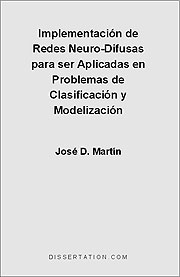LibraryPhysical Science & MathEngineering
Implementacion de Redes Neuro-Difusas para ser Aplicadas en Problemas de Clasificacion y Modelizacion
| Institution: | University of Valencia |
|---|---|
| Advisor(s): | Dr. Emilio Soria Olivas |
| Degree: | Ingenieria Electronica |
| Year: | 1999 |
| Volume: | 112 pages |
| ISBN-10: | 158112113X |
| ISBN-13: | 9781581121131 |
Abstract
Se analiza el uso de redes neuro-difusas para solucionar problemas de clasificación y modelización. El objetivo es intentar combinar las cualidades de las redes neuronales y de la descripción de sistemas mediante Lógica Difusa.
Las redes neuronales son conocidas por su alta capacidad de aprendizaje, lo que permite una adecuada generalización en el tipo de problemas comentado anteriormente. Su aplicación a problemas reales no ha dejado de crecer durante los últimos años.
Por otro lado, la Lógica Difusa es una herramienta más novedosa, cuya propiedad más atractiva es la capacidad que posee de poder tratar con variables numéricas y variables lingüísticas simultáneamente. Las variables lingüísticas permiten un tratamiento del problema más comprensible y cercano al conocimiento intuitivo humano.
Una de las principales ventajas de la combinación de estas disciplinas es la posibilidad de interpretar los resultados obtenidos por una red neuronal, pudiendo extraer conocimiento de ella. Clásicamente, las redes neuronales han sido conocidas como sistemas que podían proporcionar excelentes resultados pero que tenían el principal inconveniente de ser cajas negras, de donde era imposible obtener unas reglas de comportamiento debido a la complejidad de sus conexiones internas. De esta manera, la Lógica Difusa abre una puerta a esta posibilidad.
(Complete work in Spanish) The use of Neuro-Fuzzy Networks is analysed for solving classification and modelisation problems. The objective is to combine the properties of Neural Networks with the systems' description by using Fuzzy Logic.
The ability of learning of Neural Networks implies a good generalisation features. Their application to real problems has grown during the last years.
On the other hand, Fuzzy Logic is a recent tool, whose most attractive property is the ability for working with numeric and linguistic variables simultanously. Linguistic variables allow the user to treat problems in a more understandable way since they are near to human knowledge.
One of the main advantages of the proposed combination is the possibility of interpreting the results obtained by Neural Networks since we can extract information of Neural Networks by using Fuzzy Logic. This information will be estructured in fuzzy rules of the type "If-Then". Typically, Neural Networks have been known as systems capable to get excellent results but with the main drawback of their black-box behaviour. Thus, it was impossible to extract rules of their behaviour or learning because of the complex internal connections. Fuzzy Logic offers a feasible exit for this problem.

